With more than a thousand locations in 250 cities worldwide, UK company Stasher allows travellers to store their luggage while offering local businesses a way to earn extra cash. Having recently launched in New Zealand, co-founder and CEO Jacob Wedderburn-Day explains how the business works.
How did Stasher start and what was the inspiration behind it?
Stasher started in 2015 in London where my co-founder (Anthony Collias) and I met at university. Anthony used to live really centrally between Euston and Kings Cross which are two of the busiest train stations in London and people would often ask if they could leave something at his place. We realised then that demand for storage in cities was a real problem, and the more we looked into it, the few lockers that were available were expensive and had long queues.
At the same time, the problem was only getting bigger because Airbnb was becoming so much more popular. That meant you had all these people who needed to store their luggage since they didn’t have a concierge to leave their bags.
Eventually – kind of for fun and as a way to learn because we were still students at the time – we made this basic website where people could store things in Anthony’s flat. We then added my flat and through the process of running that we figured using shops and hotels made way more sense.
You’re currently active in a bunch of different countries worldwide, so why did you decide to launch in New Zealand now?
New Zealand and Australia combined have been on our radar for a while. Not only is it English-speaking which helps operationally and in terms of marketing, but both markets are becoming increasingly popular with tourists.
Currently, there are 17 locations live across New Zealand (nine in Auckland, six in Wellington and two in Queenstown) which are mostly based centrally. What sort of factors do you take into account when choosing storage locations?
The first thing we think about is ‘what are the main access points to the city centre?’ In an ideal world, we’d cover all airports and stadiums, but for an initial launch, the aim is to always cover the central train stations, central tourist hubs, the places you might expect people to be coming into town to do things where they’ll need somewhere to store their luggage.
It looks like a lot of these locations are based in hotels, restaurants, cafes and convenience stores. What’s your relationship with these businesses? And what commission do they receive for use of their space?
We tend to launch with independent shops first since hotel relationships can take a bit more time. We want to find businesses that have storage space that they’re looking to monetise. As cities become denser and space becomes more premium, it’s a great way to utilise that space and make it go further. These local businesses are usually eager to embrace the space as a service model.
Commission varies from place to place but broadly speaking, it’s at least 50-50. That way it shares the rewards equally and has an intuitively fair sense about it. In other parts of the world there are competitors who tend to lean on just driving foot traffic so there’s no commission, but it’s a much more fruitful relationship when there’s a split in revenue. Plus, marketing drives more customers to the store so there are benefits to both parties.
You’re also competing against lockers in airports and train stations, so why should people use Stasher instead?
Firstly, there’s the cost. In London, there’s quite a clear distinction where we’re half the price of lockers, which tend to be 12 pounds (we’re six pounds). Internationally, we try and base our pricing to undercut or at least be similar to whatever local lockers are available.
The second thing is convenience. Lockers have fixed rents and you have to pay staff to maintain them, but because we’re utilising space that already exists, we can set up in numerous locations.
The third thing is insurance, which covers up to NZ$1,000 in the event of loss, theft or damage to luggage. We introduced this because we needed to find creative ways to make people trust what we were doing and realised that this was a completely novel thing. No lockers in the world will insure your goods – it’s done entirely at your own risk. It’s the same with hotels where if you leave your bag after checking out, it’s really kind of done as a favour and there’s no liability taken. So insurance is actually something we can bring to the table to provide extra security. Luckily we’ve stored nearly half a million bags now and we haven’t had an insurance claim yet.
The beautiful thing about the model is that there are limited opportunities for things to go wrong. You’re leaving your luggage with someone we’ve vetted and they have every intent to look after it properly because they want more business. Usually they’ll store it in a room or a cupboard, but the key is that the space is locked and not publically accessible. [We’re utilising whatever] space is available and that makes it quite capital-light for us, which is great since that’s what’s enabled us to scale so quickly around the world.
It costs $8 a day to use Stasher, but is there an hourly rate?
We don’t have an hourly rate and it’s something we’ve thought quite a lot about. The reason we went with a flat fee is because in the early days of user testing, people tended to need storage for an average of about five to six hours. Very occasionally you get users who really do just need one or two hours of storage, but it’s not so common. In that case, the $8 fee may feel a little bit expensive, but what we found is that people generally quite like the flexibility. When we did tests about pricing, we realised [hourly rates] had a kind of parking metre feeling and you don’t really want that for people. You want your customers to feel relaxed that they’ve got that storage space for as long as they need.
What about funding and investment?
In January we closed a Series A round of US$2.5 million in funding. What that means is we can hire a lot more people and put more time and effort into scaling up across North America, south east Asia and Australasia. Our base has been Europe for such a long time that we really want to make sure our global footprint is bigger and stronger than that. We’ll also just be looking to invest more in the product to make it faster, better designed, more user-friendly, and be more creative with our marketing as well.
What are your goals for New Zealand in the next few years?
We have 17 locations live at the moment and I want to see that number go up to at least 50. There’s plenty more coverage to be had in cities we aren’t already in (i.e. Christchurch) and we want to look at expanding our presence via relationships with bigger hotels as well. We’ve started making inroads with Base and Nomads so I’d love to see bigger, more fruitful commercial relationships expand across their chains.
The same goes for referral partnerships. There are a few local tourist agencies and some Airbnb hosts who know about us, but really, we want everyone connected to travel to point to us when needed. Stasher right now is still kind of novel for customers who discover it, but we really want to take it from being a novelty to being something that people just know about.
This interview has been edited for clarity.

